The New Service Economy - KK-stiftelsen
The New Service Economy - KK-stiftelsen
The New Service Economy - KK-stiftelsen
You also want an ePaper? Increase the reach of your titles
YUMPU automatically turns print PDFs into web optimized ePapers that Google loves.
<strong>The</strong> <strong>New</strong> <strong>Service</strong> <strong>Economy</strong><br />
• published 51 articles in international peer-reviewed journals and 96 conference<br />
papers. In addition to this, two books within the field of userdriven<br />
service development and nine books in interrelated areas have<br />
also been published<br />
• achieved close cooperation with 13 companies and strong relevance to<br />
industry<br />
• made a considerable impact on education<br />
• steadily increased the number of senior researchers within the research<br />
environment<br />
• found new and substantial external funding after the profile period has<br />
ended.<br />
<strong>The</strong> profile has created results both from an academic and an industrial<br />
point of view. <strong>The</strong> most prominent academic results have been the accomplishment<br />
of a more stable and sustainable research environment, access to<br />
empirical data and validation of research findings from within the cooperating<br />
companies, an influx of new researchers and new skills for the research<br />
environment, international esteem and cooperation, publications and research<br />
findings. For industry, the profile has resulted in the development of<br />
new frameworks, processes and methods for service development, in dialogue<br />
and process support, the supply of manpower and publicity.<br />
Not all activities turned out as they were initially planned. During the<br />
profile period, user-driven service development and the creation of value<br />
have been given a stronger focus, while other areas have been abandoned.<br />
NSE initially planned to involve a blend of large, medium-sized and small<br />
companies, but ended up cooperating mostly with large companies and became<br />
increasingly involved with regional industry. Early on, the profile had<br />
high expectations of receiving a new professorship from the University,<br />
which has not yet been realised. Finally, NSE chose to apply a more dispersed<br />
organisational model than was initially planned.<br />
<strong>The</strong> profile period has contained events that have characterised and influenced<br />
NSE’s performance and outcome. Among the most critical events that<br />
occurred were the change of organisational strategy early on, the allotment<br />
of the editorship of a prestigious journal (IJSIM) and the publication of articles<br />
in highly ranked US journals. During the period, some cooperations<br />
with companies were discontinued, while other industrial partners were<br />
added. It is worth mentioning the cooperation with IKEA here. <strong>The</strong> midterm<br />
evaluation of the profile resulted in several measurements from the<br />
profile’s management and, at the end of the profile period, a set of important<br />
transfers of research findings and relationships were made into new research<br />
programmes. <strong>The</strong> Vinnväxt SAMOT programme may be the most prominent<br />
of these.<br />
A set of factors has been critical to the successful operation of NSE. For<br />
example, the pre-history of the research environment and its relations to<br />
8


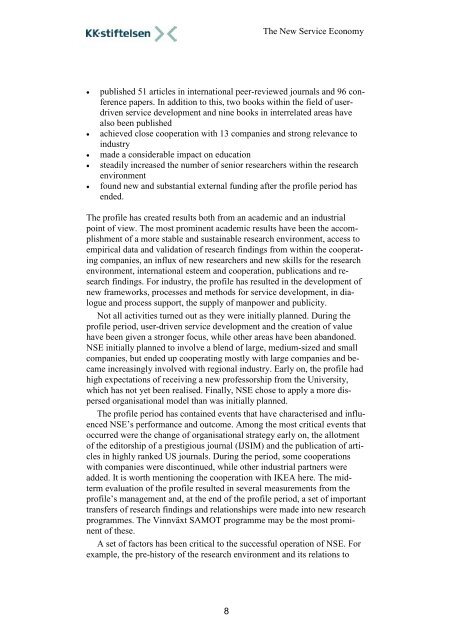
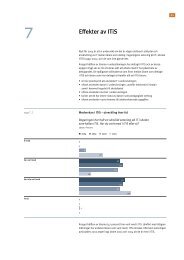
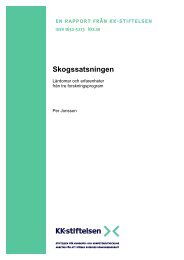
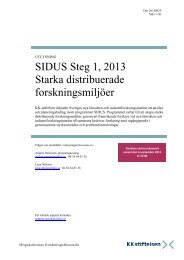
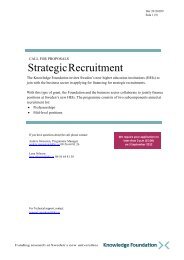
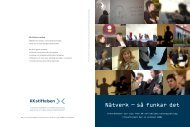
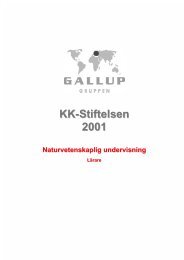
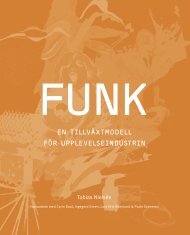
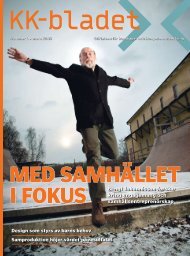

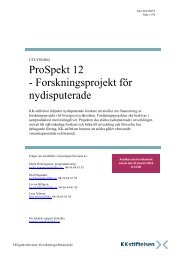
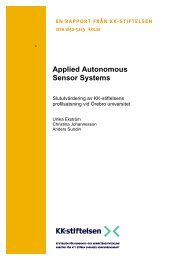

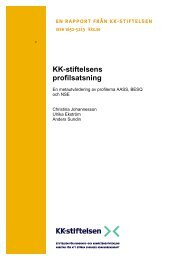
![[Klicka här och skriv titel] - KK-stiftelsen](https://img.yumpu.com/23861299/1/184x260/klicka-har-och-skriv-titel-kk-stiftelsen.jpg?quality=85)